
Join Global Consultant Susan Coleman, Host of the Peacebuilding Podcast- and today’s most innovative, courageous and inspired practitioners as we explore strategies to intervene in complex systems to build consensus and common ground across divides of worldview, culture and difference.
Join Global Consultant Susan Coleman, Host of the Peacebuilding Podcast- and today’s most innovative, courageous and inspired practitioners as we explore strategies to intervene in complex systems to build consensus and common ground across divides of worldview, culture and difference.
Episodes
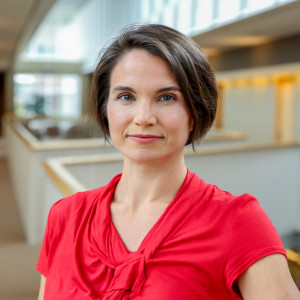
Thursday Jul 04, 2019
Ep. 039: Stephanie Savell: The Costs of War
Thursday Jul 04, 2019
Thursday Jul 04, 2019
I've been looking for somebody who could talk credibly about money. Of course, this podcast isn’t really about that. This podcast is about focusing on processes and ideas that build common ground and complex systems. However, I’ve always believed that one of the things you need to look at is money.
I'm so excited to have found Stephanie Savell and The Cost of War project. There are three women who are doing an amazing job documenting what has been spent by the United States and to some extent, other countries, on what they call the post 9/11 wars.
Stephanie Savell is an anthropologist of militarism, security and political culture and has studied these topics in the United States and in Brazil. She co-directs Brown University’s Cost of War project. She was one of the younger members and I thought it was appropriate that one of the younger members of The Cost of War project speak because it sounds like we are really mortgaging our children’s future in the United States with the amount that is being spent on the military.
Let’s hear Stephanie talk about this more as she has done a lot of research and talks credibly and clearly about what exactly is going on.
Tuesday Apr 30, 2019
Ep. 038: Rob Fersh: Finding Common Ground in the Belly of the Beast
Tuesday Apr 30, 2019
Tuesday Apr 30, 2019
A main focus of this podcast is to explore the best process interventions that build common ground and consensus in diverse and often polarized groups. But the reality is -- unless you are a process person like me – eg. a facilitator, coach, mediator – you probably don’t pay attention to process. Process is a little bit like plumbing: if it’s working, you don’t notice it, but if it’s not, watch out!! I started this podcast because I know that HOW we come together to resolve our differences has everything to do with whether we will be successful. If you create the right “container” with the right ingredients -- including meeting conditions, stakeholders, design – I am confident that you can make significant progress in bridging divides that seem unbridgeable. So, that’s why, when Convergence and Rob Fersh came to my attention I got interested. A divide that currently seems intractable to many people, especially those living in the United States, is the one between the Democrats (the left) and Republicans (the right) in the US Government. Most Americans these days are pretty frustrated, and even despairing, at the tone in Washington, the level of polarization, the acrimony. Rob founded Convergence in 2009 “to promote consensus solutions to issues of domestic and international importance”. Convergence has “mediated” or done creative problem solving around public policy issues where opposing sides agree on a goal but disagree, sometimes intensely about how to get there. The organization creates “containers” that allow opposing sides to build relationships and think together more clearly about creative ways forward. To date, it has worked on initiatives around health care, education, incarceration and is exploring other hot topics in the public policy arena such as gun safety and climate change. Rob came to Convergence after serving as the U.S. country director for Search for Common Ground, an international conflict resolution organization, where he directed national policy consensus projects and health care coverage for the uninsured and U.S. Muslim relations. He is also a very seasoned Washingtonian after many years of public service prior to Search for Common Ground. What I think will stand out to you, as it has to me, is the commitment that Rob brings to creating a safe and neutral environment for opposing sides to come together and think constructively about ways forward. When you create a good climate, people stop the demonization, trust builds, and it’s even possible to create solid and lasting relationships though people may still disagree on a number of issues. In Rob's own words “ at a minimum, at a time when people don’t talk to each other well, the people that we get to come to our tables --who are very diverse politically and otherwise -- have an amazing experience of seeing and understanding people -- and at a minimum we are lowering temperatures of the most important people – and at the best end we are having a real impact on the issues we care about. So, I invite you to tune in and hear Rob’s stories. Get inspired. It will give you hope that we can find common ground in the belly of the beast.
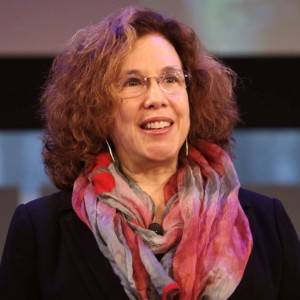
Thursday Apr 11, 2019
Thursday Apr 11, 2019
When I travel outside of the US I often think that American citizens have no idea what a “war zone” we are actually living in. Guns are rampant every where. Military hardware comes back from global combat for use by our police departments further escalating violence. Since 2001, the US has spent $32M PER HOUR on war with each taxpayer paying a total of $24,000. US military spending far exceeds every other country on earth including China which comes in a distant second. Those of us in the conflict resolution field know all too well that when you create an adversarial climate, you get identity group polarization. Sure enough, racial tensions in the US are at an epic high and, while “the feminine” is rising, girls and the feminine are under harsh attack with man in our White House who brags of assaulting women and a Supreme Court majority that does not protect women by law from domestic violence. We in the US typically think of ourselves as the envy of the world to which certainly there is some truth. But we are numb to what it costs us — on every level — to dominate the planet. So when I heard Melanie speak at the AfP annual conference about the Hands Across the Hills initiative which applies the same peacebuilding approaches used in the most deadly conflicts around the world to conflict in the US I was intrigued and wanted to learn more. Melanie is one of those souls who exudes both integrity, kindness, high professionalism and intelligence. She is currently the Managing Director at Humanity United (HU) overseeing the peacebuilding and conflict transformation portfolio which develops, refines and implements strategies to build peace and counter violent conflict. She has helped design and facilitate public peace processes in the Middle East, Northern Ireland, the Caucuses and much more. Because she is one of the most seasoned and respected practitioners in the peacebuilding field, I wanted to hear her definition of peacebuilding, how it has emerged as a field, and what she sees as the trends. “Peacebuilding” emerged in around 1990 and was first articulated by Boutros Boutros-Ghali from the United Nations. Melanie describes the various streams coming together (at least in the US) to form the peacebuilding river: the Vietnam anti-war movement, the anti-nuclear movement, the environmental movement which required large scale consensus processes to resolve disputes around land, and the Alternative Dispute Resolution movement giving rise to mediation and other collaborative processes as an alternative to the adversarial American legal system. All of these movements, she says, inspired people to act for themselves and realize that building peace wasn't just the role of the government but could and should belong to citizens as well. She continues on with an excellent definition of peacebuilding which you can hear on the track. She sees many exciting trends in peacebuilding — what we are learning about the connection between neuroscience and peacemaking, and how peacebuilding is becoming more systemically integrated into our institutions. Cool to know that many of the large peacebuilding organizations have come together to improve the “branding” of peacebuilding — to make peace enticing, and counter the news culture of “if it bleeds it leads”. The most discouraging trend to her is that, among practitioners, the US is now generally seen as a “peacebuilding problem”. All of the criteria that are red flags for a peacebuilding initiative are present in this country — the level of gun violence, the tensions, the polarization, the number of deaths from violent conflict. In the Hands Across the Hills initiative, peacebuilder Paula Green is creating dialogue between people from a very conservative area from Eastern Kentucky and a very liberal area from Western Massachusetts. Please see show notes for more information. Leave us your thoughts at https://www.susancoleman.global/the-peacebuilding-podcast. We love hearing from you.
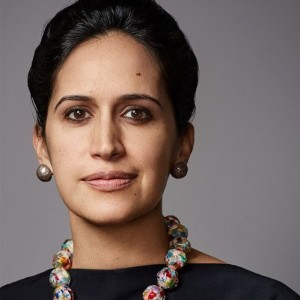
Monday Feb 11, 2019
Ep. 036: Priya Parker: The Art of Gathering
Monday Feb 11, 2019
Monday Feb 11, 2019
When Priya Parker published her recent book, the Art of Gathering: How We Meet and Why it Matters, Susan and her colleagues commiserated that we hadn't written it ourselves. The book is excellent, highly recommended and we are greatful to Priya for having written it with such great artistry. How we meet and how we gather is critical not only to the quality of our lives and connections, but to our ability to build a more innovative and peaceful world. It is the HOW that is the main focus of the Peacebuilding Podcast -- what are the best tools, techniques, processes that can build common ground in complex systems. Priya Parker is a facilitator and strategic advisor. She helps activists, elected officials, corporate executives, educators, philanthropists create transformative gatherings. She works with teams and leaders across technology business, the arts, fashion and politics to clarify their vision for a future and build meaningful purpose driven communities. She began her career and has been deeply impacted by the field of conflict resolution where she has worked on race relations on American college campuses and on peace processes in the Arab world, Southern Africa and India. Some highlights and main ideas from the episode: The first is just simply who Priya is and where she comes from, the perfect person for the job that she has. “Priya” “Parker” -- Priya is from her mom who is a South Asian Indian, and Parker, from her dad, a white Anglo-Saxon American. Her Mom, as she describes it, is a vegetarian, very liberal, comes from families that worships cows; Her father, very conservative, from an evangelical Christian background, and from a family (of cattle ranchers) that slaughters cows. Her parents divorced when Priya was 9. She spent her childhood going back and forth between these two very different worlds while thoroughly immersed in each. It was a rich learning laboratory for somebody who ultimately has become a professional gatherer and facilitator of diverse groups. We began the conversation talking about language. The word “peacebuilding” makes Priya cringe a bit because "there can be no peace without justice". Susan explains that there is strong evidence that we no longer need armed conflict, that it’s a huge waste or our precious planetary resources, and that HOW we bring people together and, in the words of Bill Ury, make the room and world safe for conflict is key. Priya agrees and quotes a friend: “if we had more conflict in the world, we would have less violence.” Susan’s favorite ideas from the interview are the linked ideas of the power of modern ritual to help groups connect across difference and creating temporary, alternative realities in gatherings to, in a sense, make them safe for conflict. Pulling from shamanic traditions, Priya describes how she creates rituals, processes and experiences that actually help people experience alternative worlds where people can deal with the “danger” of conflict and difference. She shares an example how she created a unique and fun process with an architecture firm to help them shift out of their polarization and “stuckness”. In the course of interviews for her book, Priya realized that the most powerful rituals come from more monocultural groups. But, many of these don’t work anymore -- both for people coming from those cultural groups and for communities or gatherings that are multicultural. So how, she asks, do we intentionally, purposefully, create a sense of ritual, maybe perhaps even a sense of the sacred, that will ultimately be the magic that allows people to connect, make contact, transform and move into a different state? How do we reinvent modern ritual to match the needs of our communities in an explicit way that allows us to connect with each other when we are not the same? Please give a listen to this episode. It is chock full of insights for any gathering, conflictual or not, that you may find yourself at the middle of hosting.
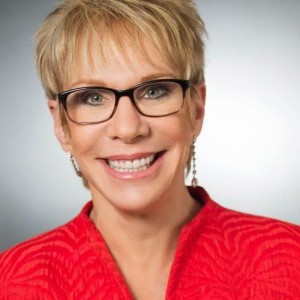
Tuesday Jan 29, 2019
Tuesday Jan 29, 2019
In this episode, Susan turns to the topic of money and its connection to women’s empowerment and building a more peaceful planet. If you really want to understand what's going on in a complex system, follow the money. As earlier guests on the show have pointed out, our war system is hugely profitable to some (and very costly to all other people and life) – approximately $2 trillion dollars a year. We also have a virtual global epidemic of women’s codependency on men – by one seasoned expert’s estimation -- about 90%, and money is very much at the heart of this. Women stepping into their power is key to building peace and, as money is the currency of power, women getting smart about money goes hand in glove. That's where Barbara Huson comes in, not because she professes to be an expert on military expenditures or global peace but rather is the leading authority on women, wealth and power. Barbara is a bestselling author. She's written books like "Prince Charming isn't coming” "Secrets of Six Figure Women", "Sacred Success” and has been featured on many popular shows. Her own story is compelling: “I grew up relying on my father (the “R” of H&R Block), then my husband, to manage my money. But early in my marriage, I found out my husband was a compulsive gambler. And here’s the insane part — I continued to let him manage the money because that’s how scared and intimidated I was by money. It wasn’t until a devastating financial crisis became a personal wake-up call. I got tax bills for over $1m for illegal deals my ex got us in. He’d left the country, I didn’t have $1m, and my father wouldn’t lend me the money. I had three daughters — one just a baby, and I was not going to raise them on the street. That’s when I knew I had to get smart. And I did.” Some episode highlights: “Its not the money that’s going to give us power. I don’t believe that money gives you power. Money has no power. It’s the process of who we have to become to be good stewards of our money. We have to become a powerful woman, and a powerful woman, is someone who knows who she is, who knows what she wants and expresses that in the world unapologetically.” Women are still so deeply codependent from so many centuries of conditioning. As a result, we will undermine ourselves in all kinds of ways such as care-taking dysfunctional men or putting ourselves in harms way, because of our deep belief that our survival simply depends on it. Throughout the episode, Susan and Barbara both share personal stories of how they fell into this trap and pulled themselves out of it. A second is, Barbara confirms what Susan has been hearing in different venues, that -- at least in the United States --70% of all wealth will be transferred to women in the 21st century. Women are earning more money and inheriting more, but not necessarily commanding this resource with confidence and power but rather often handing that job over to men. Finally, according to Barbara, when it comes to money, women are motivated by different things than men around money. They will yawn and glaze over when it’s just about money for money’s sake but get more fired up when they begin to see the power of helping their families and communities. That’s why her target audience is women who want to create wealth because they are purpose driven and know, as Mother Teresa said, that it takes a check book to change the world. Given that, Susan takes the leap that if women get much smarter about their own money, we might also start paying attention and saying NO, like Leymah Gbowee did around war in Liberia, to the trillions of global annual military spending that is not addressing any of our very urgent planetary problems today. Please listen to this delightful person who is so generous and simply great fun to just spend time with. Whatever gender, you will gain a lot of insight.
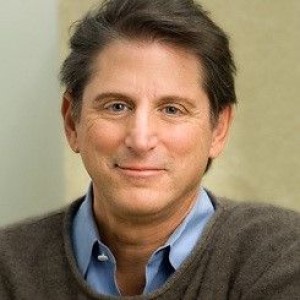
Wednesday Oct 17, 2018
Ep 34 Terry Real: Building Peace - From the Intimate to the Global
Wednesday Oct 17, 2018
Wednesday Oct 17, 2018
What’s the connection between what happens between people in their intimate relationships and what’s happening on the global stage? In this conversation with Susan, Terry Real makes those connections – clearly, powerfully and with huge insight. Terry is a nationally recognized family therapist, author and teacher in the United States. He's particularly known for his groundbreaking work on men and male psychology as well as his work on gender and couples. He's been in private practice for over 25 years and has appeared often as a relationship expert on popular shows in the United States like Good Morning America, ABC News, media venues such as Oprah 2020, The Today Show, CNN, The New York Times. A statement that Susan most associates with Terry is “to walk into intimacy, men and women must walk out of patriarchy.” And his unorthodox approach to couples’ therapy, which is essentially mediation at the intimate level, is “ whenever I have a woman who's in trouble in a couple, my first move is to empower the woman, and whenever I have a man in trouble in the couple, my first move is to empower the woman.” “Women's voices”, he believes, “are the voices that will be the wedge into patriarchy. Men will catch up, but women will lead the charge.” This is a powerful metaphor for why Susan believes that empowering women, and getting gender right on the planet, is the most impactful peacebuilding initiative we can undertake. When Susan asks Terry to make the links between the intimate and the global, he says “it is dead easy, it's about the basic mistake of patriarchy which is also known as dominion. The essential mistake of patriarchy is that as a man -- and patriarchy is masculinity writ large -- you are to be in control, you are above nature, you are Lord and Master, whether you are above the nature of your child, above the nature of your own vulnerabilities or nature as embodied by your wife or mother nature.” He also goes on to say that masculinity is basically at war with itself between the old model, the patriarchal model, and the new model, what he calls an ecological model, emerging especially among millennial men. He says that “the shift from a dominion model to a collaborative model, or the shift from a patriarchal model to a democratic model, is that you move out of the hubris, the pride, the delusion that you are above nature, and standing above the system, whatever that system is: your marriage your family your planet. You're not standing above this system, you're in it; you are a subcomponent part of it and you have to move inside the system effectively with the humility and clear perception of where you are in it.” Powerfully he says, "the delusion of dominance is lethal. . . Let me say that again because I conclude many of my talks this way: we will move beyond patriarchy or we will die. It's that simple." And addressing women, Terry says "Women are up to their eyeballs with co-dependency whether it's mothers tearfully and pridefully sending their sons off to war or women voting for Trump in the United States and places like that". He says that “whenever he has a woman who fears that speaking truth to power will have repercussions. . . I will never dismiss or pathologize these concerns because guess what, there are consequences. . . but ultimately you should do it anyway . . .because life is better when we speak up. . . when you have congruence inside your skin.”
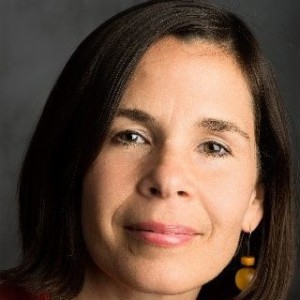
Tuesday Oct 09, 2018
Ep 33 Dr. Catherine Barnes: Overcoming Our Addiction To Coercion
Tuesday Oct 09, 2018
Tuesday Oct 09, 2018
Join us in conversation with Catherine Barnes. I (Steve) first met Catherine at a dialog and facilitation retreat in rural Myanmar. I was struck by the degree of presence that she bought to her work, mentoring and accompanying an emerging generation of positive change makers in that fascinating yet troubled country. Catherine is a rare breed of scholar practitioner. Her work is deeply grounded in decades of field work across thirty countries, while her research and writing covering topics of facilitation, dialog, activism, and social justice blends a high level of insight with accessibility. She is faculty member of the Center for Justice and Peacebuilding at Eastern Mennonite University and freelance peace researcher and practitioner, particularly as concerns dialog and facilitation techniques across conflict divides. Her comments in this episode are so relevant to our times. She describes our “addiction to coercion”, whereby we – internationally and domestically – try to compel others to accept our goals and points of view rather than expending our efforts and resources on collaborative activity for the greater good. She relates this to the increasing polarisation that we are experiencing domestically and internationally, and how we have in the past, and can in the future, find ways back through dialog and collaborative action. Catherine demystifies peace processes that are designed and implemented to end civil wars, drawing on examples from Tajikistan, Sierra Leone, Bosnia and elsewhere, and tracing the path from elite lead peace agreements to more the more inclusive peace processes of modern times. This conversation takes place against a backdrop of the increasing complexity of local and global forces that shape civil war conflicts, which renews calls that peace needs to be grown organically from within an affected society, not implanted in the form of blueprints from outsiders. Take a listen, and check out the show notes for a detailed summary and Catherine’s bio: https://www.susancoleman.global/sn033-catherine-barnes
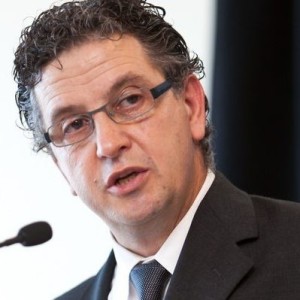
Monday Oct 08, 2018
Ep 32 Graeme Simpson: What Young People Can Teach Us About Building Peace
Monday Oct 08, 2018
Monday Oct 08, 2018
Join us in conversation with Graeme Simpson, US Director of the non-profit Interpeace, and lead author of the United Nation’s flagship Progress Report on Youth, Peace, and Security. The highly participatory process of producing this work has been as important as some of its findings. Hundreds of youth across dozens of countries were involved in developing recommendations that underscore, among many other things, how young people are creative sources of peace, confronting their stereotype as primary perpetrators of violence. The young people that Graeme engages with question the efforts of peacebuilding institutions to “bring youth to the table”, highlighting a marginalisation and mistrust of governments and global institutions that has huge and troubling implications, yet at the same time inspires us with alternative, creative forms of organising and peacebuilding in a modern world. Graeme’s work shines a light on a glaring disconnect between the “integrated lived experience of people caught up in violent conflict”, and our national and global policies and organisations, which divide peace and conflict up into illusionary stages and distinct themes that are intimately connected on the ground. As with Graeme’s earlier work founding and leading South Africa’s Centre for Violence and Reconciliation, our approaches to supporting people and societies need to be better integrated and less siloed according to outsider priorities, and better at “listening down” to affected communities so we can “talk up” to donors and policy makers. We end by touching upon gender, where Graeme challenges the stereotype of the girl as a victim and the boy with the gun. Graeme is an articulate and passionate speaker whose policy work is deeply grounded in the lived experience of people experiencing conflict and forging peace. You can review a detailed version of the show notes with full links and a copy of his biography here: https://www.susancoleman.global/sn-32-graeme-simpson
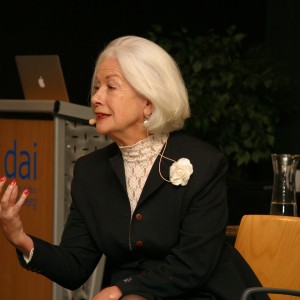
Friday Jun 15, 2018
Ep 31 Dr. Scilla Elworthy -- A Business Plan for Peace
Friday Jun 15, 2018
Friday Jun 15, 2018
In this episode, Susan speaks with Scilla Elworthy Ph D. three times nominated for the Nobel Peace Prize for her work with the Oxford Research Group, which she founded in 1982 to develop effective dialogue between nuclear weapons policy-makers worldwide and their critics. She founded Peace Direct in 2002 to fund, promote and learn from local peace-builders in conflict areas. Dr. Elworthy has been an adviser to Archbishop Desmond Tutu and Sir Richard Branson in setting up “The Elders”, an independent body of global leaders working for peace, and her TED talk on nonviolence has been viewed 1,400,000 times. Her latest book, The Business Plan for Peace is a clear and very readable how-to to create a world beyond war. Scilla also co-founded Rising Women, Rising World in 2013 and Femme Q in 2016 to establish the qualities of feminine intelligence that are so needed by both women and men to build a safer world. For Susan, this guest, more clearly than anyone, links to her passion of connecting gender and peace. Susan asks Scilla to speak to “women worldwide” about why it’s time to step into our leadership on the issue of war and peace. “We have research-based evidence that indicates that preventing war is not difficult” Scilla tells us. “We know what we can do and we know what we shouldn’t be doing in order to get war to stop--we just haven’t done it. The first thing we need to stop doing is spending $1,686 billion annually on militarization. $30 billion would eliminate starvation worldwide and $10 billion would bring clean water to every child on the planet. Many people haven’t noticed how enormous this spending really is and how much it is costing society.” Scilla describes how, in the last 20 years or so grassroots peacebuilding organizations worldwide working within their local communities have grown from 350 to 1600! She tells the story of a woman named Gulalai Ismail who lives in Northwest Pakistan –perhaps the most dangerous place in the world to be a woman, and the same place from whence came Malala. Through her conflict prevention efforts, Gulalai has been able to dissuade hundreds of suicide bombers from their mission. In the interview, Scilla observes that the 5 permanent members of the UN Security Council are also the biggest arms sellers in the world. This is an irony that we all need to be more aware of. Susan and Scilla talk about the amazing example of Leymah Gbowee and her Nobel award winning work to end the civil war in Liberia. Dr. Elworthy has gotten to know many grassroots organizations globally who are working to prevent war in their regions and has found that the organizations that are woman-run are having a greater impact. Dr. Elsworthy provides an example of a violent episode where a crowd was about to lynch someone. A trained woman would enter the mob and raise her hand, palm forward and shout, “Stop this. Go home. Your mother would be ashamed of you.” There would be complete silence and the crowd would disband. Dr. Elworthy does not use the word “patriarchy” much because she believes that both men and women are capable of embodying what she calls “masculine intelligence” and “feminine intelligence.” The reality of the history of the last 3000 years is that most, if not all, major decisions have been made using masculine intelligence and what we are left with is a series of wars. Scilla talks about her early childhood and the seeds that were planted in her to become a peacebuilder, as well as the inner critic she has had to face to do her best work. She advises that, when you combine what breaks your heart with what you’re skilled at, you will be most effective and ultimately full of hope and joy instead of anguish and anxiety. Archbishop Desmond Tutu of South Africa is the most joyful person she has ever met and he has experienced some of the most brutal things in the world. Please listen to this amazing episode. You will not be disappointed.
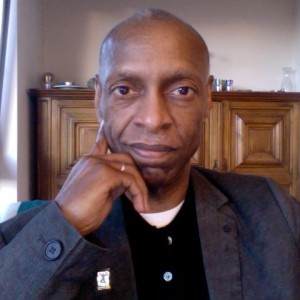
Friday May 11, 2018
Friday May 11, 2018
The United Nations is a polarising institution. Some people look to the UN as a trusted expert and moral voice concerning issues related to the environment, development and poverty alleviation, human health, and peace and security. Others see United Nations agencies, funds, and programs as highly bureaucratic, ineffective, and outdated. The United Nations might have weaknesses, but when it comes to the complex challenges of peacebuilding in some of the world's toughest contexts, can we imagine a viable alternative if the United Nations were not to play a leading role? And what is the nature of that role? How does it relate to the work of other stakeholders in conflict settings, and what is life like for the diverse mix of international peacebuilders who choose to make far-flung countries their home in the pursuit of peace? Joe Washington recently retired from the post of Chief Training Officer for the United Nations Mission in South Sudan. His more than ten years of experience of working throughout the United Nations peacekeeping missions in Sudan and South Sudan spanned these countries' historic peace process and partitioning into two separate states, and the subsequent violence that engulfed South Sudan in the years after independence. Prior to this Joe served for more than two decades as an adjunct or visiting professor, researcher, lecturer, or director of programs for various academic institutions in Europe and the United States in the fields of conflict resolution and human rights. Joe's personal warmth and acute sense for the human, relational dimensions of effective peacebuilding are matched by deep insight on the strengths and weaknesses of the United Nations. This episode will be of particular interest to people who are interested in this organisation or the broader challenges of peacebuilding working in a difficult context like South Sudan. For those that have experienced either, Joe's words might be therapeutic! Some highlights include: • Joe's recollection of what motivated him to pursue an international career, and the role models and educational pathways that led him to a United Nations career; • The need as a peacebuilder for reflective practice, whereby you try to realise that you see the world with different eyes and may have different priorities than your counterparts. Joe reminds us of the need for peacebuilders to have high cross-cultural sensitivity, especially when local counterparts have basic needs and livelihoods concerns that international peacebuilders don't; • The separation between local and international stakeholders in peacebuilding settings is again discussed in relation to the relative wealth of international people in poor countries, which can drive up local prices and reinforce divisions between insiders and outsiders that makes fostering local ownership difficult; • Joe dissects United Nations infamous bureaucratic challenges, and argues that instead of finger pointing at other parts of the UN system, staff should focus on their circle of influence, and work more collaboratively in order to expand that circle; • The reality of 'camp life' is laid bare, as Joe paints a picture of daily life living in shipping containers in a United Nations compound, and describes the lifestyle in remote areas in the midst of conflict; • In response to Susan's question on the value of the United Nations as opposed to other actors that could potentially use the same resources more effectively, Joe suggests - with good reason - that the peacekeeping mission might have prevented a genocide in this country in the last few years. A fascinating man and life story - take a listen.